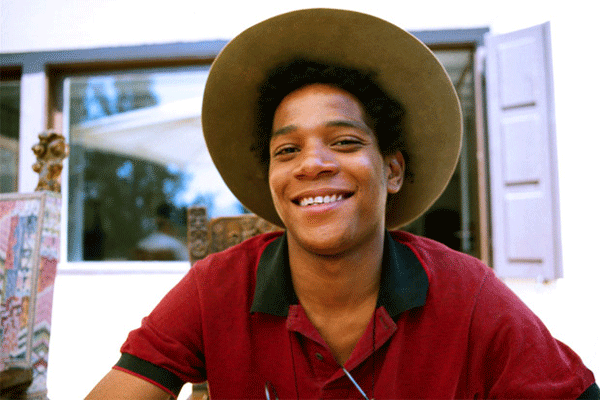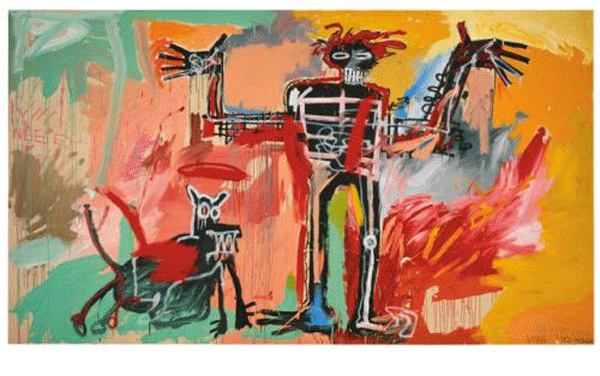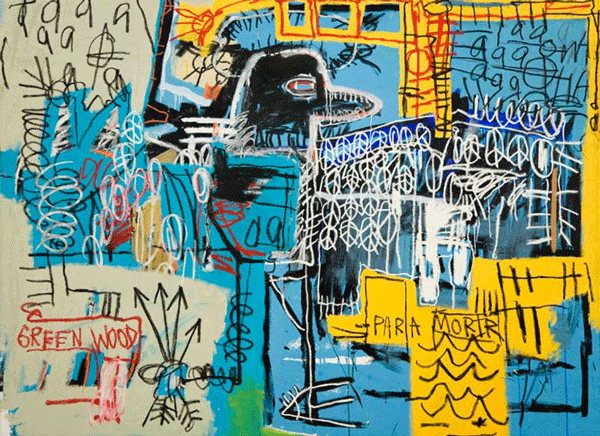-
Favorite Sun: Basquiat as “The Radiant Child”
by Alice Gregory July 30, 2010
Jean-Michel Basquiat: The Radiant Child, titled after Rene Ricard’s seminal 1984 Artforum article, is a departure for Tamra Davis, director of such blockbusters as Billy Madison, Half Baked, and Crossroads. But Child is not the aberration it might seem; Davis has also shot music videos for The Beastie Boys (Mike D is her husband), The Lemonheads, N.W.A., Depeche Mode, and Sonic Youth. And Davis’s close, personal friendship with Basquiat affords her access to the central characters in the artist’s life, as well as lending a pervasive sense of intimacy to her film, which elaborates on – but always returns to – a rare interview she shot with him in 1986.
In a Q&A with the A.V. Club, Davis categorizes her interview subjects as being amongst a “list of people [she] felt Jean-Michel would have wanted me to speak with.” And it’s true that she has gathered some of the most significant personas of New York’s “Downtown 500,” – the 1980s cultural storm localized in SoHo but centered around Basquiat himself – to offer their thoughts. Many of those interviewed seem eager to both aggrandize a long-gone New York and to conflate it with a certain brand of obsolete celebrity. In the words of Fab Five Freddy: “Who wants to be famous now? That shit is whack.”
Surely though, a seemingly expansive but in fact incestuous group of cultural tastemakers exists in every era, despite what everyone says about the “good old days.” The Radiant Child, released exactly one year after Dash Snow’s overdose, reminds us – as if we really needed reminding – that an untenable lifestyle is often prerequisite for creative and moneyed infamy. That said, celebrity and talent are not necessary corollaries, obviously, and one should be reluctant to compare the careers of Snow and Basquiat. Their milieus – and deaths – might have been analogous, but they are not in the same league.
And this might be the primary, though perhaps unintentional, success of the film – the extent to which Davis is able to capture Basquiat’s genius. She claims to have wanted “to make a film that wasn’t just a biography,” but one that “when you watched it, you actually felt that you watched a movie, that you had an emotional reaction.” The Radiant Child undoubtedly draws an emotional reaction. But counter-intuitively, our sympathies are not garnered from the central interview, which, it should be said, is actually quite dull, but rather from the way in which the actual art is filmed. The work just looks so good. Davis indulges the paintings themselves, granting close-up detail shots and allowing them bleed to the edge of screen. The primacy of the art is somewhat surprising here, especially coming from such an uncritical, adoring, and personally invested filmmaker, and one with such an undeniably pleasing subject.
It’s unclear whether the archival footage has been edited so as to exaggerate Basquiat’s charisma or whether Basquiat’s charisma is just potent enough to redeem even most throwaway of reels. Regardless, you half-expect his charms to subsume his talent. To locate Basquiat’s genius in that paradox of personality would be a misstep though, and one that he would hate. In 1981, when Annina Nosei offered him a room underneath her SoHo gallery to use as a workspace, Basquiat’s career transitioned from street to studio. He takes deep offense, however, to an interviewer who jokingly refers to him as an artist “locked in a basement.” Basquiat, without a moment’s hesitation, responds that if he were white, he would be called an “artist in residence.”
Raised in Brooklyn by immigrant parents – his mother was Puerto Rican and his father was Haitian – Basquiat grew up trilingual and comfortably middleclass. Well-versed in art history, he resented the dismissals of his work as “child-like” and “primal.” “Primal?” he asks, “Like a primate? Like an ape?” He considered his critics, the ones who tended to review his personality rather than his work, to be “mostly just racists.” Though sympathetic and to a degree irrefutable, it’s a fraught paranoia. It’s tempting for critics to conflate Basquiat’s work with his personal appeal and similarly tempting for Basquiat himself to read prejudice into that conflation, but this could just as easily be an occupational hazard of having a magnetic personality.
The film’s interviewees make up an all-star cast: Julian Schnabel, Larry Gagosian, Bruno Bischofberger, Tony Shafrazi, Fab 5 Freddy, Jeffrey Deitch, Glenn O’Brien, Maripol, Kai Eric, Nicholas Taylor, Fred Hoffmann, Michael Holman, Diego Cortez, Annina Nosei, Suzanne Mallouk, Rene Ricard, and Kenny Scharf. These luminaries all seem to cast Jean-Michel Basquiat as that archetypical genius, too sensitive and too passionate for life, a victim of his own exhaustion. Even the spectrum of his dining is extreme: he goes from scavenging for scraps on the street to dinners at Mr. Chow’s in one year. One senses that Basquiat’ death, callous as it sounds, came as a sort of deus ex machina, saving him from inevitable bastardization and complete fatigue. As friend and mentor Julian Schnabel eulogizes, “He just didn’t have the tools to navigate the sea of shit.”
It takes a certain amount of abandon to acknowledge genius, but Basquiat’s is undeniable. Self-mythologizing is intentional by definition, but Basquiat is able to strive without betraying his originality, able to network without compromising his autonomy. He cuts a cult figure. It’s an impressive feat to seek, and then claim, the friendship and admiration of Andy Warhol, giving the impression, all the while, of total guilelessness. We see Basquiat chewing gum, lounging in a Wesleyan University t-shirt, playing with puppies, and dancing around to his favorite bebop music. But we also see him chugging bottles of Evian from Dean and Deluca, stuffing wads of cash between the pages of William S. Burroughs books, walking the runway at a Comme des Garcons show, and painting in Armani suits. The innocence and bravura don’t seem at odds though. This accomplishment would almost be enough in itself, but when paired with his body of work, Basquiat appears creatively infallible. The Radiant Child is tediously chronological at times, feeling oddly long for an 88-minute film. But despite this, and even against the backdrop of such seductiveness, Basquiat’s talent comes off as indisputable and inevitable, exposed by a lifestyle, but not determined by it. Davis has turned at least one skeptic into a believer.




